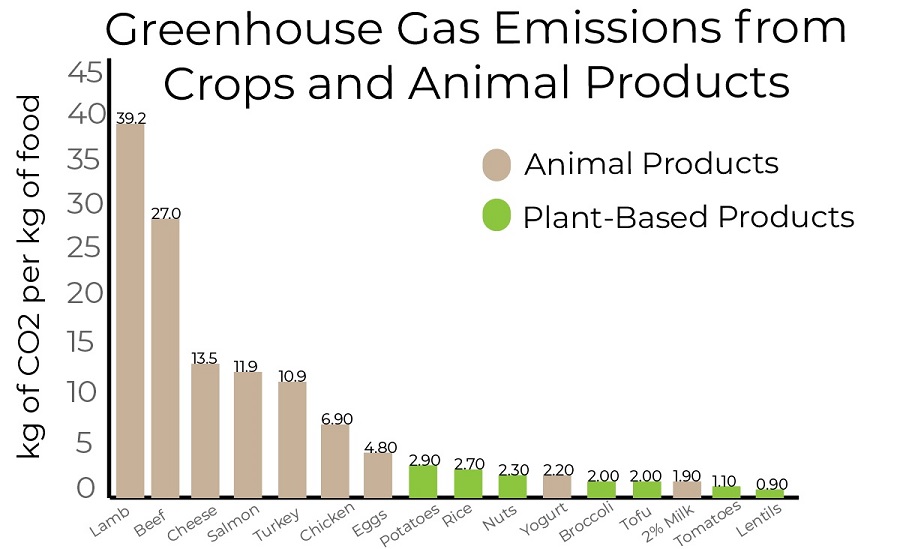Every time you buy and eat food you are having an impact on the environment. The food we eat requires land, water, fertilizer, and transportation, resulting in agriculture being one of the top 5 greenhouse gas emitting industries in the world. Luckily, some food is less destructive on the environment than others, meaning we can all reduce our carbon footprints by changing where we buy, what we buy, and how we buy our food.
WHERE YOU BUY:
Changing where you buy your food can greatly alter how much carbon is emitted from your diet. A lot of grocery store chains fly in food from countries across the world, resulting in a lot of carbon emissions from cargo travel. Farmers markets and local co-ops, on the other hand, generally sell food that was sourced from local farmers, resulting in very few emissions from transportation. Buying from these local sources means you’re lowering the carbon footprint of your diet while also supporting your local economy. It will also force you to buy produce that is in season in your area, meaning it will be of higher quality and won’t have been grown in a greenhouse (which is a very energy intensive method of growing).
WHAT YOU BUY:
Changing what you eat is arguably one of the most important things you can do to not just lower the carbon footprint of your diet, but to lower your carbon footprint as a whole. Animal products like meat and dairy require a lot of land, water, animal feed, and processing among other resources, making them a high emitter of greenhouse gases when compared to plant-based foods like fruits, vegetables, beans, and legumes. The Environmental Working Group conducted a study in 2011 that looked at the emissions of animal products vs. plant-based products, and found that every animal product emitted at least 4.8 kg of CO2 per kg of product, with the most emitting animal product, lamb, emitted a stunning 39.2 kg of CO2 per kg of product. This is vastly more than the plant-based products they evaluated, as the highest emitting plant-based product, potatoes, emitted just 2.9 kg of CO2 per kg of product. This is such a drastic difference, that some scientists say you could cut your carbon footprint by half just by cutting out animal products from your diet.

Graphic created by Kayla Guilliams with information adapted from the Environmental Working Group.
HOW YOU BUY:
Changing how you buy won’t drastically change your carbon footprint like changing where you buy and what you buy, but can greatly reduce how much waste you produce. When you go shopping, bring both big reusable bags and small reusable produce bags to avoid plastic bags. If your local store has a bulk section, buy your dry goods from them using reusable bags. If they don’t, buy these goods packaged in materials like cardboard, metal, and glass rather than plastic. Plastic pollution is plaguing our lands and waterways, and avoiding it as much as possible when food shopping can help with this epidemic.
If you take anything from this article, take this- buy locally, buy plant-based, and buy without plastic. You don’t have to go cold turkey on your old habits- take it one step at a time. Every time you buy an apple from the farmers market rather than a chain store, every time you buy legumes instead of steak, and every time you use a reusable bag instead of a plastic bag, you are making positive steps to reduce your carbon footprint- and every step counts.

Kayla Guilliams
Is the blog manager for Zero Waste Club, combining her love for writing with her passion for all things environmental sustainability. She is currently a student at the University of North Carolina at Chapel Hill where she is studying journalism, environmental studies, and food studies in hopes of building a career in environmental activism. You can find her on Instagram as @kaylaguilliams.
